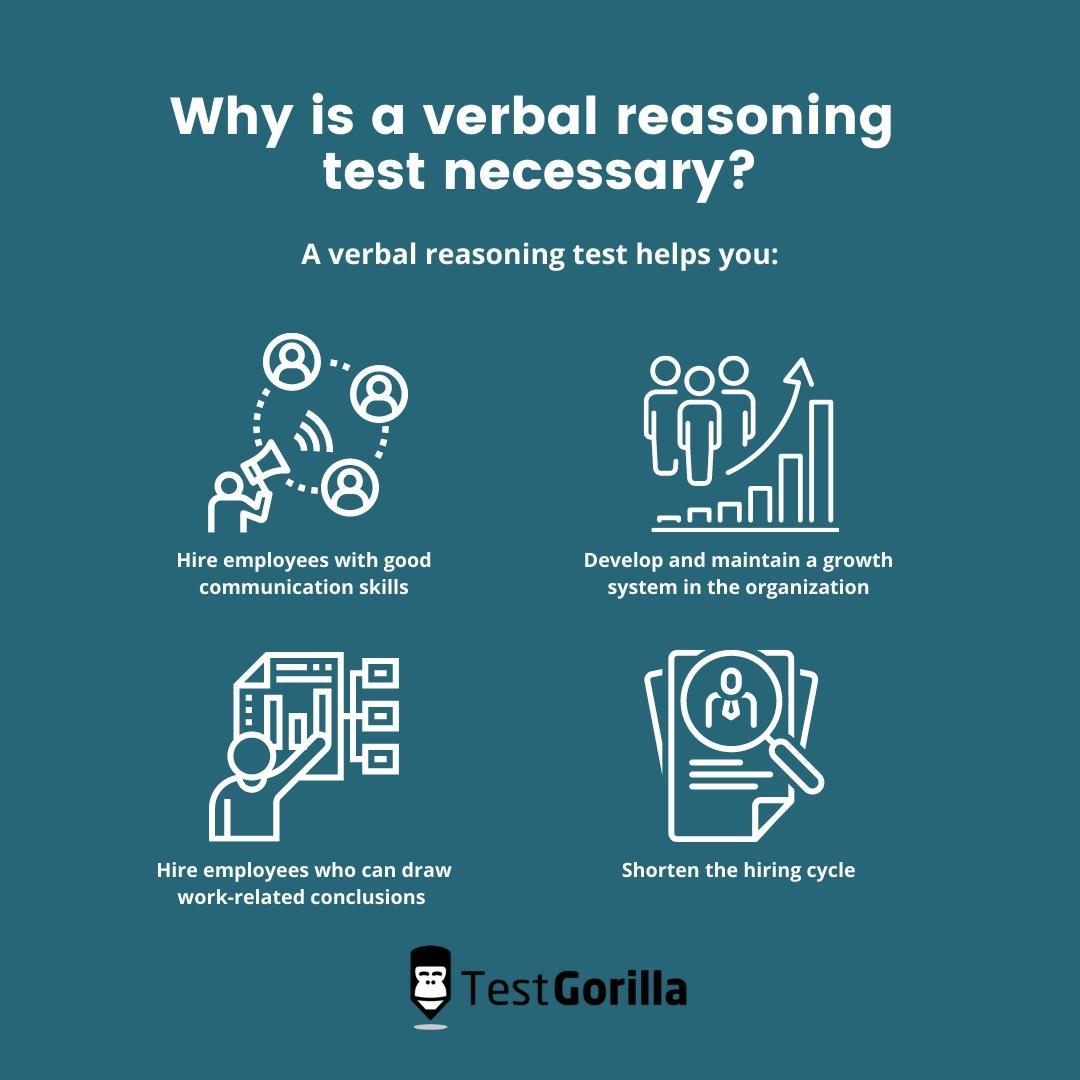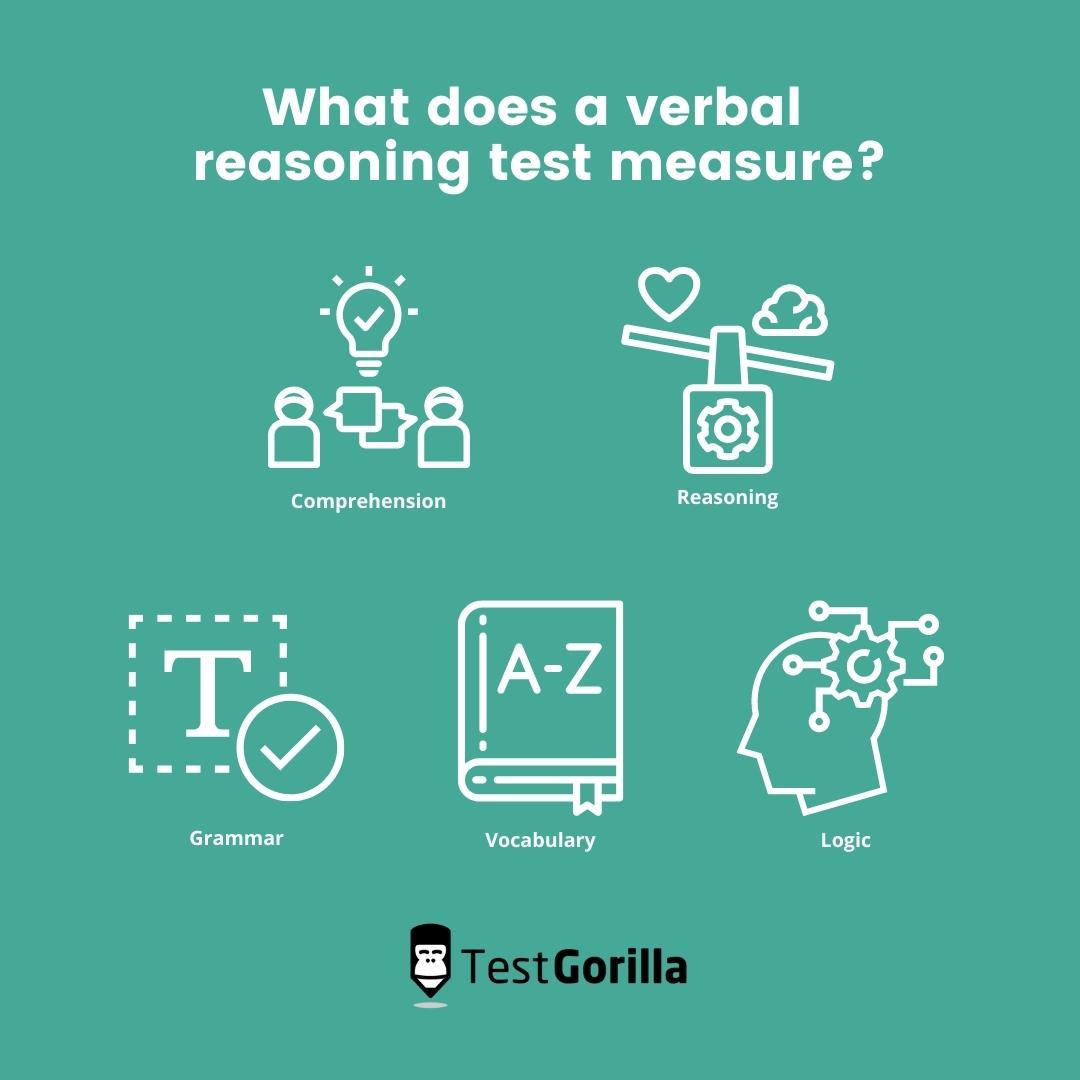Among many ways of trying to hire the most qualified personnel for your job opening, conducting cognitive-ability tests proves to be one of the most effective. One such test is the Verbal Reasoning test.
But what exactly does a verbal reasoning test measure?
A verbal reasoning test helps you measure potential employees’ cognitive skills in specific, real-life scenarios. This gives you additional metrics which can impact your hiring process.
When hiring, it’s crucial to identify the best candidate for your organization’s growth. Using verbal reasoning tests will aid your recruitment process and raise the quality of candidates you select for the job.
In this article, we’ll explain how verbal skills tests facilitate your selection process. You’ll also discover what to consider when carrying out this test and how it best suits your hiring needs.
Let’s dive in!
What is a verbal reasoning test?
A verbal reasoning test assesses applicants’ abilities to comprehend, analyze, and interpret information from written passages.
Such passages in a verbal reasoning test help evaluate how an applicant makes inferences.
Moreover, the test includes a collection of different assessment questions, which may include:
Identifying relationships between words
Replicating words with scenarios
Answering “true,” “false,” and “cannot be determined” questions
As noted, this test helps to determine the verbal agility of a candidate in a recruitment exercise. Verbal skill includes making meaning from written words and being able to put them down in writing as well.
Why is a verbal reasoning test necessary?
Conducting a verbal reasoning test for prospective employees is necessary because it provides a sound basis for organizational growth. Any working environment requires employees with excellent verbal reasoning abilities.
It’s impossible to overstate the importance of testing for verbal reasoning skills in an applicant. And testing for this skill has become more important with the growth of remote jobs worldwide.
Conducting this test helps in a variety of ways:
1. Hire employees with good communication skills
Conducting this cognitive-reasoning test will allow you to employ candidates with professional communication skills. Good communication skills improve interaction with and between subordinates, colleagues, managers, and prospective or existing clients.
Hence, it facilitates an adequate work culture and enhances a positive working relationship between employees.
2. Develop and maintain a growth system in the organization
A verbal reasoning test reveals the knowledge deficit of your employees. As a result, the test helps to establish and maintain a system for facilitating their professional growth. This system can also become useful in subsequent hiring processes.
3. Hire employees who can draw work-related conclusions
The ability of a potential employee to understand workplace cultural documentation is essential as it determines how successful they would be on the job.
Identifying how each employee can make conclusions about this documentation through a verbal reasoning test is necessary.
4. Shorten the hiring cycle
Recruiting a qualified candidate is often a long and daunting task for hiring managers. However, conducting a verbal reasoning test helps to assess various qualities of your applicants simultaneously, thus shortening the hiring process.
The best insights on HR and recruitment, delivered to your inbox.
Biweekly updates. No spam. Unsubscribe any time.
What does a verbal reasoning test measure?
Verbal reasoning tests measure the core skill of verbal agility and intelligence. To identify the perfect candidate, you need to test your applicants on the necessary skills to succeed in the job.
Access to the core skills of an applicant, which a verbal reasoning test provides, is a vital step in hiring excellent candidates.
Our Verbal Reasoning test measures the following core skills:
1. Comprehension
The test evaluates the comprehension and understanding power of your candidates. It overviews a prospective employee’s ability to make meaning from written reports, documents, and statements.
The test measures prospective employees’ comprehension abilities by providing a written passage followed by questions they should answer. A candidate’s ability to answer correctly indicates a thorough understanding of the passage.
2. Reasoning
The Verbal Reasoning test also measures the reasoning abilities of applicants for your organization’s role. The test evaluates how accurately and precisely an applicant can interpret a logical statement in a written passage.
Measuring this skill shows you if your candidate can make inferences correctly or whether they jump to conclusions inappropriately.
3. Grammar and Vocabulary
Communication is one of the metrics a verbal reasoning test measures. The test provides an insight into how prospective employees express their thoughts, which could be both in writing and speaking.
Again, an employee who can harness grammar and vocabulary properly will possess outstanding workplace communication skills. These skills are vital in your workplace, ensuring that the organization grows in the direction you hope.
4. Logic
For success at work, it is essential that your prospective employees can recognize and identify logical statements. As a result, conducting a verbal reasoning assessment helps you measure their logical ability and how suitable they are for the role.
You should include logical statements, which you may or may not clearly state, in the test you conduct for prospective employees. Their success here shows how well they can extract important details from statements presented to them.
How can you conduct your verbal reasoning test?
The goal of conducting various assessments for employees is to ensure that you employ the best applicant for the job.
To achieve this, it is vital to perform the test correctly and fairly. You can conduct your test in the three ways listed below:
1. Basic test
This testing method does not include a comprehensive assessment of an applicant’s verbal reasoning skills. Instead, it primarily evaluates sentence completion, word identification, and analogies.
The basic test measures an applicant’s ability to communicate and understand information by providing words that complete an idea or thought.
2. Compound test
This method assesses an applicant’s ability to draw logical conclusions. It also measures their capacity to make informed decisions from written documents embedded with logical statements.
In comparison to the basic test, it’s a more comprehensive assessment.
3. Complex test
This method reveals your applicant’s comprehension by providing them with complex statements of logical information, followed by a series of questions to which the applicant must provide simple, straightforward, and concise answers.
How successful you are in hiring a worthy candidate for your open role depends on the method you applied when conducting this test. While each of the aforementioned tests is effective, combining them would yield better results or help you to identify the most suitable way of performing this test.
Hire your next excellent employee
Using a verbal reasoning test when hiring does not automatically guarantee that you will hire an excellent employee – to be sure you identify the strongest candidate, you must conduct the test correctly.
As such, incorporating a pre-screening assessment is effective only when you use standardized and professionally developed tests.
Our subject-matter experts have prepared a Verbal Reasoning test that satisfies this requirement. It’s perfect for roles that require a good level of reasoning and language proficiency to perform.
At the same time, our test is cost-effective and time efficient as it enables you to select the best candidate quickly without bias. And using our tests helps your recruitment process become streamlined and less stressful.
Register with TestGorilla today to get started.
You've scrolled this far
Why not try TestGorilla for free, and see what happens when you put skills first.




















